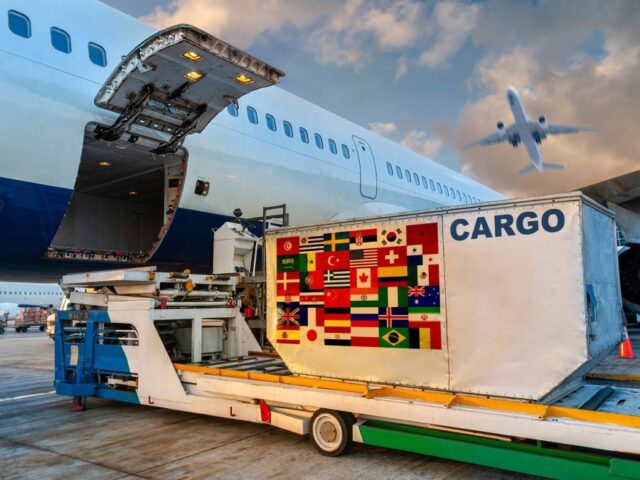FRI, JAN 05 2024-theGBJournal| Africa is expected to experience a more modest 1.5% air cargo growth in 2024, according to the International Air Transport Association (IATA).
IATA projects also that the Middle East will experience the biggest rise at 12.3% just as all other regions.
On average, air cargo is forecast to grow 4.5%, IATA said in its latest air cargo analysis. It also noted that cargo volumes are expected to be 58 and 61 million tonnes in 2023 and 2024, respectively.
The airlines watch dog recently uprgraded industry outlook to $25.7 billion profit in 2024 and described the upgrade as a ”is a tribute to aviation’s resilience.”
“Yields will likely decline in 2024 but they will still be above their 2019 levels,” says Rachel Yuting Fan, IATA Sustainability and Economics.
“Cargo revenue will also be about 11% above 2019 and comprise 12% of total industry revenue. In other words, 2024 will see sustained revenue growth and the sector outperform pre-pandemic levels.”
According to IATA, the relevant economic markers are also positive with 3.5% growth in global trade projected for 2024. Broadly, belly capacity is back and will carry the majority of air cargo while preighters have disappeared entirely. Dedicated freighters will maintain their usual share of the market.
Other beneficial factors include the continued growth of e-commerce, the reduction in delivery times, and the robust performance of high-value specialized products, such as pharmaceuticals, which seem resilient to the industry’s usual volatility.
Possible downsides include China’s supply chain and currency fluctuations.
Overall:
Cargo revenues are expected to fall to $111 billion in 2024.
Yields will remain high by historical standards, despite falling in 2023 and 2024. Yield progression has been extraordinary in recent years (-8.2% in 2019, +54.7% in 2020, +25.9% in 2021, +7% in 2022, -32.2% in 2023 ).
Cargo volumes are expected to reach 61 million tonnes in 2024.
Addressing challenges
Digitalization and sustainability will continue to be critical to air cargo’s progress.
Digitalization must overcome 50-year-old legacy systems and embrace a true data-sharing environment rather than just digitize paper documents. The problem is the varied data in air cargo, which covers different functions, stakeholders, and formats. This makes any streamlining attempts extremely complex.
“ONE Record will help,” says Henk Mulder, IATA’s Head, Digital Cargo. “It is an open standard that will connect the data and will be vital to digitalization success. It has been tested and validated by over 200 companies for reliability and efficiency and all airlines must implement ONE Record by 1 January 2026.”
With ONE Record in place, there will be a unified approach to structuring air cargo data, which in turn will facilitate consistency in information exchange. Importantly, this seamless data sharing will utilize advanced encryption and security protocols to protect sensitive information.
The implementation of Preloading Advance Cargo Information (PLACI) will also be a notable milestone. The objective is increased cargo security, but PLACI is a complex undertaking and governments are not harmonizing their efforts. Unaligned PLACI programs make data sharing more difficult and run the risk of slowing down cargo flows.
Digitalization will give air cargo not only the ability to serve e-commerce growth and smooth capacity fluctuations but also provide the analytics to boost sustainability.
Several elements of sustainability—aside from carbon emission reduction—are at play in air cargo, including:
-Eliminating single use plastics
-Lowering the loss of perishables
-Advocating for sustainable facilities
-Attracting and retaining young talent.
Humanitarian aid
Safety always tops the agenda, of course, and lithium batteries continue to dominate. Anticipated developments in 2024 include a reduction in the acceptable state of charge and the designation of lithium battery-powered vehicles.
Meanwhile, by 2025 there could also be changes to ICAO Annex 18 to assist regulatory oversight of supply chain safety and a standard for fire-resistant ULDs.
Air cargo will also continue to be a conduit for humanitarian aid. In 2023, the UN World Food Program estimated that 362 people were in need in humanitarian assistance globally. This was a record high, with basically one in 22 people in the globe requiring assistance.
Air cargo is pivotal to people receiving assistance where necessary. Since 2020, the EU Humanitarian Air Bridge has delivered more than 4,000 tons of aid. And following the earthquake in Türkiye and Syria, 29 key carriers delivered over 3,500 tons of aid from over 90 countries and provided transport for over 130,000 responders from across the world.
“The air cargo industry is in a better place than it was in 2019,” says Brendan Sullivan, IATA’s Head of Cargo. “We had an exceptional period during the pandemic. We became financially stronger, more efficient with advances in digitalization, and were appreciated for the heroic efforts that we all made to keep cargo going during a very difficult crisis. Now, the challenges and opportunities that we face are familiar to us and we will work hard to make progress in every aspect.”
X-@theGBJournal|Facebook-the Government and Business Journal|email:gbj@govbusinessjournal.com|govandbusinessj@gmail.com










